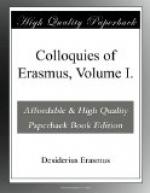And for that End, I have labour’d to give such a Translation of them, as might in the general, be capable of being compar’d with the Original, endeavouring to avoid running into a Paraphrase: But keeping as close to the Original as I could, without Latinizing and deviating from the_ English Idiom, and so depriving the English Reader of that Pleasure, that Erasmus so plentifully entertains his Reader with in Latin.
It is true, Sir Roger l’Estrange and Mr. Tho. Brown, have formerly done some select Colloquies, and Mr. H.M. many years since has translated the whole; but the former being rather Paraphrases than Translations, are not so capable of affording the Assistance before-mention’d; and as to the latter, besides that his Version is grown very scarce, the Style is not only antient, but too flat for so pleasant and facetious an Author as Erasmus is.
I do not pretend to have come up in my English, to that Life and Beauty of Erasmus in Latin, which as it is often inimitable in the English Language, so it is also a Task fit to be undertaken by none but an English Erasmus himself, i.e. one that had the same Felicity of Expression that he had; but I hope it will appear that I have kept my Author still in my Eye, tho’ I have followed him passibus haud aequis, and could seldom come up to him. I shall not detain you any longer; but subscribe my self, yours to serve you,
Jan. 25th, N. BAILEY. 1724-5.
The LIFE of ERASMUS.
DESIDERIUS Erasmus, surnamed Roterodamus, was born at Roterdam, a Town of Holland, on the Vigil of Simon and Jude, or October the 20th or 28th, 1465, according to his Epitaph at Basil; or according to the Account of his life, Erasmo Auctore, circa annum, &c. about the Year 1467, which agrees with the Inscription of his Statue at Roterdam, which being the Place of his Nativity, may be suppos’d to be the most authentick. His Mother’s Name was Margaret, the Daughter of one Peter, a Physician of Sevenbergen. His Father’s Name was Gerard, who carried on a private Correspondence with her, upon Promise of Marriage; and as it should seem from the Life which has Erasmus’s Name before it, was actually contracted to her, which seems plainly to be insinuated by these Words; Sunt qui intercessisse verba ferunt: However, it is not to be denied that Erasmus was born out of Wedlock, and on that Account, Father Theophilus Ragnaud, has this pleasant Passage concerning him: If one may be allow’d to droll upon a Man, that droll’d upon all the World, Erasmus, tho’ he was not the Son of a King, yet he was the Son of a crown’d Head, meaning a Priest. But in this he appears to have been mistaken, in that his Father was not in Orders




